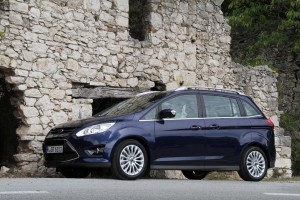
With new products like the 2012 C-Max, Ford stands a good chance of gaining more market share, reports a new survey.
For the first time since 1995, Detroit’s Big Three makers gained market share last year – and a new poll of industry leaders suggests that Motown will be able to keep that momentum going.
New product, new technology, improved quality and other factors are all contributing to Detroit’s turnaround, according to the 12th annual global automotive survey by the audit and advisory firm KPMG International. Titled “Creating a Future Roadmap for the Automotive Industry,” the KPMG 2011 Global Automotive Executive Survey underscores a number of significant trends sweeping through the car business here and abroad.
 “The survey is a predictor of change,” said Dieter Becker, director of KPMG’s global automotive operations, and one of the biggest factors behind the anticipated change is the rising cost of petroleum. Today, the survey suggests, “Fuel efficiency is the number one consumer concern.”
“The survey is a predictor of change,” said Dieter Becker, director of KPMG’s global automotive operations, and one of the biggest factors behind the anticipated change is the rising cost of petroleum. Today, the survey suggests, “Fuel efficiency is the number one consumer concern.”
Delivering more fuel-efficient products has certainly helped Detroit, which saw its market share rise to 45% for all of 2010, an improvement all the more significant considering the bankruptcies of General Motors and Chrysler just the year before – and GM’s decision to eliminate four of its eight North American brands after emerging from Chapter 11 protection.
When 200 senior automotive executives from around the world were asked by KPMG which brands would gain share over the next five years, 43% picked Ford. In the 2010 survey, only 29% picked Ford, and in 2009 the figure was just 13%. Ford actually gained 1.2 points of share last year, rising to 16.7%.
General Motors scored an even more impressive turnaround in terms of industry expectations. A full 40% of the survey respondents now expect it to gain share over the next five years – the same number that predict a gain for Toyota. Last year’s KPMG survey found only 13% of respondents expecting GM to gain share. In reality, GM lost 0.7 points of market share in 2010, to come in at 19.1% – but the four surviving brands all picked up sales and share.
Chrysler, which gained a half point of share – to reach 9.4% in 2010 – is projected to gain share by 24% of the respondents, up from just 7.5% the year before.
KPMG officials describe as “astounding” the favorable view of Detroit’s prospects, all the more so in light of the domestic industry’s recent troubles.
The survey also found that industry leaders are bullish about the U.S. auto market’s recovery, anticipating sales will climb to as much as 13.3 million this year, up from 11.6 million in 2010 and just 10.4 million in 2009.
The KPMG survey also predicts dramatic changes around the world.
“In many ways, there is a two-tier global market in play,” said Becker, adding that critical forces like population growth, urbanization and fuel prices are not only fostering change but leading to very different solutions in developed and emerging markets.
“More mature countries are struggling to cope with the problem of changing mobility behavior while in up-and-coming regions in Asia, for example, there is a push to deliver a variety of cars to populations eager for greater mobility. Automakers will need to act quickly to meet these expectations,” he said.
More than three-quarters of the respondents said they expect urban planning will have a dramatic impact on future vehicle design.
Meanwhile, though only 9% of the respondents believe that electric vehicles will become a significant part of their strategies, many believe it critical to stay on top of what could be a “game-changing” solution.
“Such a forward-thinking approach could become the competitive edge that will accelerate these companies into a leadership position in a realigned automotive value chain,” stressed Becker.
Significantly, 68% of those who participated in the survey say their approach to “mobility service solutions” say they are forming partnerships and alliances, whether with competing automakers or component suppliers, to help curb capital costs and speed up technology development.
“In this brave new world of changing market conditions, supplier evolution and the drive for rapid innovation, pooling knowledge is a must,” said Becker, KPMG’s Global Head of Automotive.
